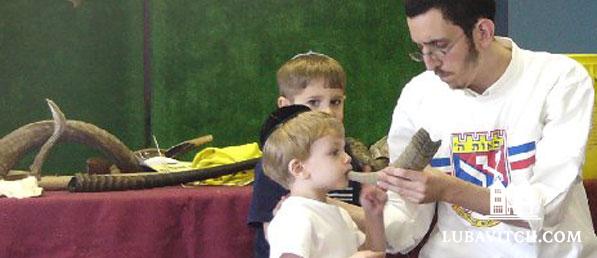(lubavitch.com) September, six years ago, Rabbi Dov Mandel was a new Chabad rabbi on the Fort Worth block. He ordered 40 rams' horns from a supplier (a Chabad colleague) and prepared for his first-ever Shofar Factory.
The venue was set, the children were invited, but less than a week before the program, Mandel discovered that his order wasn't going to be filled: the supplier was oversold. Forced to find his own cache, Mandel made "2-300 phone calls and finally found a factory 20 minutes from Fort Worth."
Mandel was in business that Rosh Hashanah and since then, he has become a supplier himself. Today he estimates that he and the original seller ship some 12,000 horns to fellow Chabad rabbis in the months before the High Holidays. Other outfitters boast similar numbers. Come autumn, rams' horns are a best-selling commodity.
Shofar Factories are popping up in cities across the globe, attracting children to explore the significance of the shofar and the holiday it represents. Depending on the age and background of the group, presenters may discuss the simple meanings of the holiday and its symbols or the legal guidelines for its construction and the kabbalistic meanings of Rosh Hashanah.
During the one hour, participants make their own shofars and learn how to blow them. At the end of their visit to the Shofar Factory, they leave with a polished shofar. To the rabbis who administer these programs, the children's gains represent a far greater cornucopia.
"Each hour is jam-packed with so much information, the kids don't realize how much they have learned," shares Rabbi Mordechai Grossbaum of Minnetonka, Minnesota. "There is a significant amount of research today pointing to the effectiveness of hands-on learning," he continues. "It is more productive than simple textbook study and the lessons are clearly more memorable."
Grossbaum has been running Shofar Factories in Minnesota since 1995. The senior Grossbaum, Rabbi Gershon, "developed the concept of creative, hands-on programs," says his son, when in 1974 he ran the first Model Matzah Bakery. He brought an oven, preparation booths, and rolling pins to the local JCC, pioneering the idea that interactive Judaism can be transported to any classroom or community center. Since then, Matzah Bakeries have become a staple of Chabad's pre-Passover lineup. And it doesn't stop there.
The popular "Living Legacy" programs, which bring rabbis to the front of classrooms several time a year, run the gamut from an oil press before Chanukah to a Havdallah candle-making workshop and a Biblical calligraphy class. In Minnesota alone, Grossbaum has presented to over 100,000 children in every Jewish institution and school in the state. Hebrew School students tell him that the highlight of their four years of afternoon Jewish study was his programming.
Chabad rabbis around the country perfect and expand on their colleagues' programming, figuring out ways to "make the presentations as streamlined as possible," Grossbaum explains. "We have to get in, get out, and present a lot of material in an hour." Over the years, he has created backdrops, props, and handouts that can be easily transported and presented. As is the case with shofars, different rabbis specialize in each project, supplying materials and know-how to their peers.
Where once the rabbis cleaned and sterilized their own horns, Mandel says that is what he pays the slaughterhouse to do today. "They boil the horns to separate the membrane connecting the horn and a bone, soak them in chlorine and soap, and allow them to dry in the sun for days. I pay them to clean and sell me their trash." Explains Grossbaum, "we needed to figure out what we wanted the students to leave with, we needed to simplify the program in order for them to gain the most amount of information."
Rabbi Dovid Tiechtel has led the shofar workshop on the University of Illinois at Urbana-Champaign for five years. "Some of the college students are familiar with the signs of the holiday, the shofar and the honey, but that's where it ends," he says. "Some don't even know that much. But this hands-on 'project' allows for a great segue into a conversation about the deeper aspects of the holiday. It gets them asking questions and discussing things they didn't know they were interested in."
This year, Tiechtel's wife Goldie, is branching away from the Shofar Factory, instead hosting a different hands-on evening: a honey and apple tasting for the Jewish female students on campus. Students will taste five different types of honey and half a dozen apple varieties, before making honey cookies and discussing the concepts intrinsic to a sweet new year.
"We are offering a beyond the basics of what I learned in Hebrew school event, which allows students to ease into meaningful discussions. They get a lot more than they realize," she says.
Teaching adults with the hands-on approach is gaining popularity, adds Grossbaum. He is busy refining a similar program module for older learners, a "Tupperware-type evening," where the event is hosted in individual homes for friends. Several pilot runs and focus groups have proven it is a popular venture.
In Minnesota, a recent Jewish Federation study reported that only 23 percent of adults participate in any form of Jewish adult education. "We have to bring it to them in their homes," believes Grossbaum. "We need to show them that it is not just study, it is fun, it is sociable. It is a tremendous program."
Tooting his own horn? Maybe. But judging by the numbers worldwide, Shofar Factories are really making noise.

Be the first to write a comment.